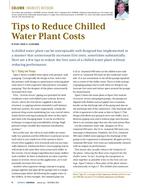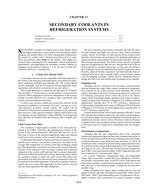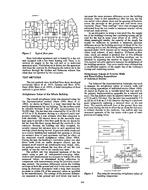Today’s supermarket refrigerating systems predominantly use the direct expansion vapor compression cycle to provide cooling to refrigeration and freezer display cases. These systems typically involve large refrigerant leakage rates due to the long lengths of piping and the large number of fittings required to connect the display case evaporator to the compressor and condenser located in the machine room. Next to the environmental concerns of global warming and ozone depletion associated with leakage of the currently used CFC and HCFC refrigerants, there is also a concern for the rising cost of purchasing suitable alternative refrigerants as those currently used are phased out. These challenges faced by supermarkets may be suitably addressed through the implementation of a secondary loop system. Secondary loop refrigeration can reduce or eliminate the direct harmful impact of refrigerant leakage to the environment; however, work must be done to optimize the operation of secondary loop systems to minimize inefficiencies and their indirect environmental impacts. This paper provides an irreversibility evaluation of a secondary loop system to help identify the dominant contributors to system inefficiency and a discussion on the major challenges that are faced in order to successfully implement secondary loop refrigerating systems in supermarket applications.
Units: Dual
Citation: Symposium, ASHRAE Transactions, vol. 107, pt. 2
Product Details
- Published:
- 2001
- Number of Pages:
- 7
- File Size:
- 1 file , 640 KB
- Product Code(s):
- D-7047


